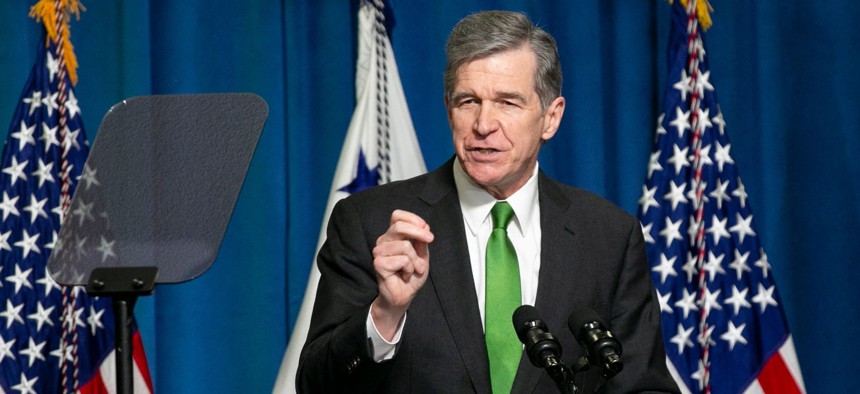Why This Governor is Optimistic His State Will Soon Expand Medicaid

North Carolina Governor Roy Cooper speaks during an event in March 2022. Allison Joyce / AFP
Gov. Roy Cooper, of North Carolina, noted during a Route Fifty event that Republican opposition in his state is "thawing" when it comes to opening the program to more low-income residents. The state is one of 12 that hasn't expanded Medicaid.
North Carolina is one of just a dozen states that has not expanded Medicaid using an option available under federal law to provide health coverage to more low-income Americans.
Democratic Gov. Roy Cooper's latest push to change that in recent months fell short amid opposition from the Republican-controlled legislature, even though there's extra money available from the federal government for states that move ahead with the expansion.
But Cooper, during an interview that aired as part of Route Fifty's State of the States event Monday, voiced optimism that he and others who support the Medicaid expansion would soon prevail in getting the policy adopted. "Opposition to Medicaid expansion in North Carolina is thawing rapidly," he said. "I believe that it will happen."
"I’m hopeful that it will this year," he later added, pointing to state's legislative session this year as a window of opportunity.
Cooper said a reason he believes resistance is waning is that it is becoming clearer that the expansion could provide some of its greatest benefits in the state to people living in Republican-leaning rural areas.
"It's gonna help save rural hospitals," he said. "It will increase jobs."
The governor's attempt last year to negotiate with Republican lawmakers to get the Medicaid expansion included in budget legislation was unsuccessful. But that package did call for a joint legislative task force that began meeting last month.
"They’ve had a number of meetings, we’re getting positive feedback," Cooper said.
Republican legislative leaders in the state have indicated that they could be open to a vote on Medicaid expansion, possibly before the November election, WRAL reported last month. And state Senate leader Phil Berger signaled last year that he was willing to consider going along with the expansion.
This past session, Senate Republicans were inclined to allow the expansion plan, but members of the House GOP posed a roadblock, Cooper explained, a dynamic that was flipped from a couple years earlier when the House was supportive and the Senate opposed.
Short-term Savings, and Some Added Long-term Costs
Medicaid is jointly run and funded by the federal government and the states.
In states that have adopted the Medicaid expansion under the 2010 Affordable Care Act, most adults with incomes up to 138% of the federal poverty level are eligible for the program. That income level in 2022 is about $18,700 for an individual.
Federal figures show that as of September last year about 2 million people in North Carolina were enrolled in the program, along with the related Children's Health Insurance Program. A 2018 analysis by the Urban Institute estimated that around 600,000 more people would take part in the program in North Carolina if it were expanded.
North Carolina has about 10.5 million residents.
Data compiled by the Kaiser Family Foundation show that Medicaid spending in North Carolina during 2019-20 timeframe totaled nearly $15 billion. The federal government typically picks up about two-thirds of the costs and the state the rest.
The American Rescue Plan included a perk for states that opt to expand Medicaid in the form of a 5 percentage point boost to the federal match for the traditional part of the program (not the expansion portion) for two years. Federal matching for those covered by the expansion is 90%, higher than for other enrollees.
A March 1 presentation by the North Carolina General Assembly's Fiscal Research Division to the Medicaid task force said that the incentive match would save the state's general fund $1.4 billion to $1.5 billion over the two years.
But looking beyond the short-term savings, the analysis notes that expanding the program would also mean an estimated $500 million to $600 million in added annual costs for the state in future years.
In Medicaid expansion holdout states, critics often point to the costs as a reason for why lawmakers should be wary of the change.
Cooper emphasized that many of the people who stand to gain coverage under the expanded version of the program are low income, but fall into a gap where they earn too much to qualify for Medicaid, but are also ineligible for health insurance subsidies. "We're talking about working families," he added. "More and more Republicans are beginning to see that."
Bill Lucia is executive editor for Route Fifty and is based in Olympia, Washigton.

NEXT STORY: States Grapple With Allowing High School Athlete Endorsements






